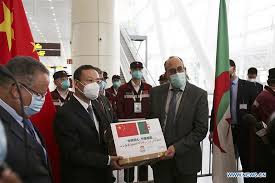China calls for international cooperation against COVID-19 to tide over darkest hours

Beijing: A senior Chinese diplomat on Sunday underlined the significance of international cooperation and solidarity in fighting COVID-19 to tide over the darkest hours.
State Councilor and Foreign Minister Wang Yi said at a press conference that the novel coronavirus is the common enemy of mankind. “Cooperation and solidarity are the most powerful weapon to prevail over the epidemic.”
So far, the pandemic has claimed over 300,000 lives and affected more than 7 billion people in over 210 countries and regions.
However, the “political virus” of some politicians losing no chance to attack and smear China is now spreading in the United States, Wang said on the sidelines of the annual national legislative session.
Some politicians ignored the basic facts and made up countless lies and conspiracy theories concerning China. Such lies have been recently compiled into a list and posted on the internet, he added.
“The longer the list, the more it says about how low the rumor-mongers are willing to go and the more stains they will leave in history,” Wang said.
Wang’s stern message came at a time when some U.S. politicians launched repeated attacks against China’s virus response, unjustly blamed China for their own porous response, and filed unwarranted lawsuits for so-called compensation.
“I want to say here: Don’t waste any more precious time, and don’t ignore lives,” he said.
Wang expressed his sympathies to the United States, with the highest number of infections of any country. “We sincerely hope that the American people will get over the epidemic as soon as possible,” he said.
Having claimed so many precious lives, COVID-19 serves as a stark reminder that countries must rise above differences in geography, race, history, culture and social system, Wang said.
As the pandemic battered the global economy, China called for cooperation and communication to mitigate the impact of COVID-19.
The United States and China should start to coordinate and communicate over macro-policies as early as possible to reduce the impact of the disease on both economies and the world economy, Wang said.
The global economy is on track to contract by 3 percent in 2020 as a result of the pandemic, the IMF projected in its World Economic Outlook in mid-April.
Wang called on countries to stand “shoulder by shoulder” and seek positive cycles of mutual success, dismissing narratives of a “knock-out race” in which there is but one winner.
On Sino-Russian relations, Wang said China will stabilize cooperation in energy and step up collaboration with Russia in emerging sectors such as e-commerce, biomedicine and the cloud economy.
Talking about relations with Europe, Wang said the two sides shall explore mutually beneficial cooperation in the areas of connectivity, environmental protection, digital economy and artificial intelligence.
Hailing China-Japan-ROK cooperation as a model of virus fight, Wang advocated raising the level of regional economic cooperation by upholding free trade, cutting tariffs, opening up markets, and tapping new growth engines in health, intelligent manufacturing and 5G.
To help African countries to tackle the grim situation, China pledged to reduce debt obligations for African countries and provide further support to those countries in extreme predicament, Wang said.
Guided by the notion of “a community with a shared future for humanity,” China has mounted the largest ever global humanitarian operation in decades.
China has shipped medical supplies to nearly 150 countries and four international organizations to meet their immediate needs. It has exported 56.8 billion masks and 250 million protective suits, among other provisions.
“China is not a savior, but is willing to be a friend in need and a sincere partner,” Wang said.
Though the virus is profoundly changing the world, it will not reverse the trend of globalization, nor will it undermine China’s resolve in advancing international cooperation.
Responding to a question on the Belt and Road (B&R), Wang said the impact of COVID-19 on B&R cooperation is “temporary and limited,” and the cooperation will be strengthened.
During the past seven years, China’s goods trade with B&R countries surpassed 7.8 trillion U.S. dollars and its direct investment in those countries was over 110 billion dollars.
“By aiming for high-standard, people-centered and sustainable progress, we will make the Belt and Road a model of development, cooperation and health for all engaged,” he said. “The darkest time will pass, and the light is ahead,” Wang said.





